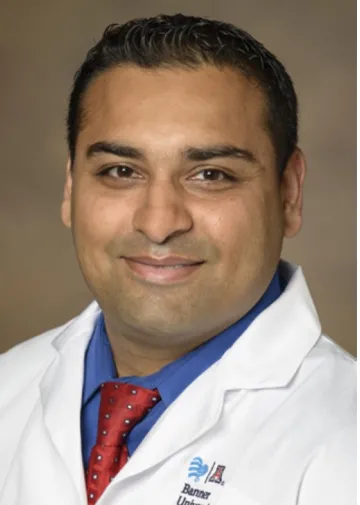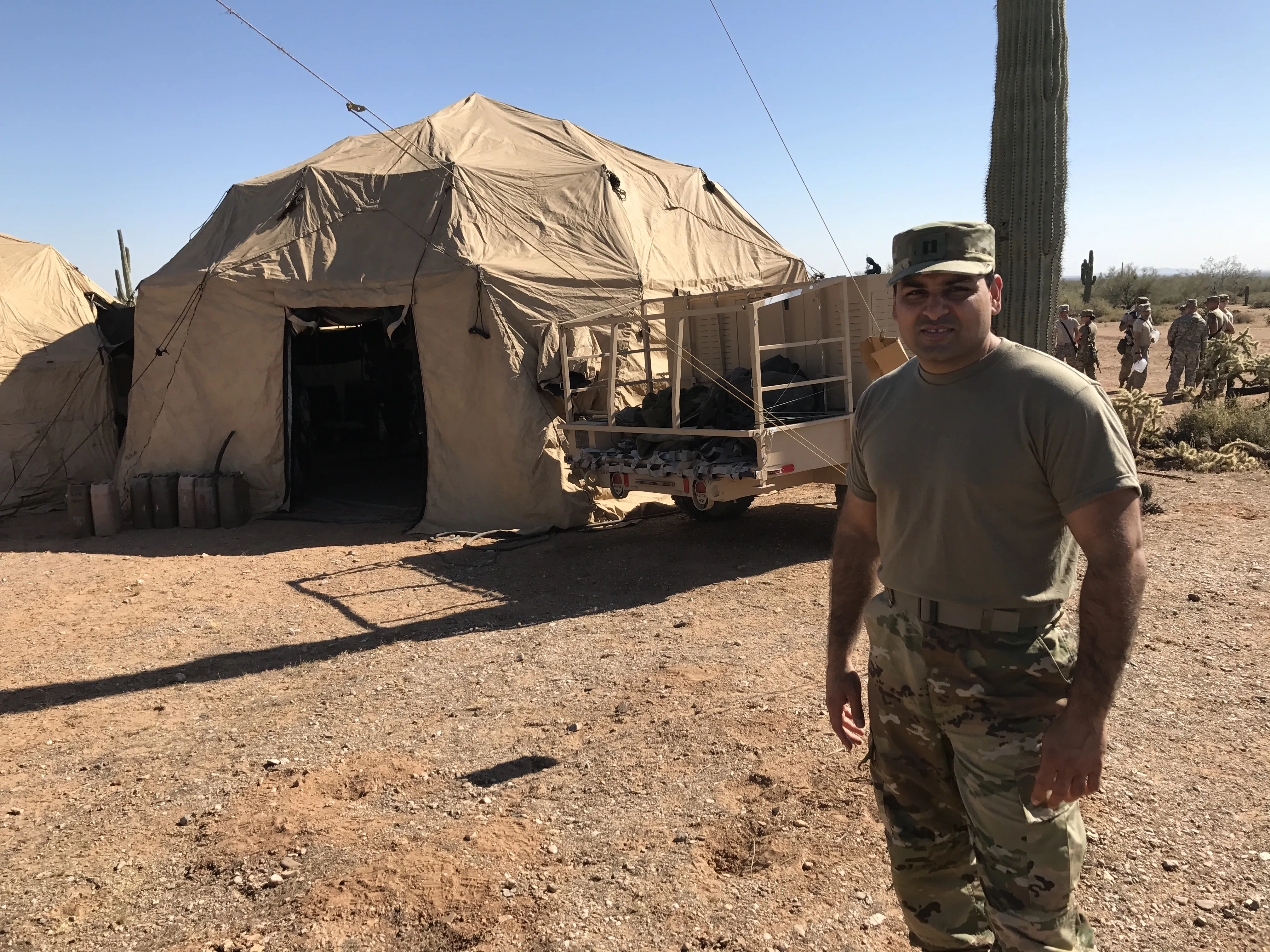Leadership Under Pressure: Dr. Adil Lokhandwala, Surgeon and Officer

If Adil Lokhandwala, MD, is defined by anything, it’s a relentless pursuit of his goals and a steadfast commitment to hard work.
Two decades ago when he came to the U.S., Dr. Lokhandwala, now a trauma fellow at the University of Arizona Department of Surgery, was a personal trainer and competitive bodybuilder.
He was determined to build a life for himself, and he found himself dreaming about becoming a doctor. Now, as a surgeon and a captain in the U.S. Army, Dr. Lokhandwala applies the same work ethic, leadership skills and resourcefulness during his operations as a physician and military member.
Dr. Lokhandwala admired the armed services as a child. He watched military movies and used to joke around with his parents that he would probably join one day.
As he got older, he thought more and more about going to California, a mecca for bodybuilding. In pursuit of that ambition, he left India in his early 20s, joining family in New York City but later venturing out in NYC on his own to follow his own goals.
At the same time, he was introduced to a group of people in his community who worked in medicine and managed a private scholarship. They encouraged Dr. Lokhandwala to go to college for a field like exercise science or nutrition, which would provide a pathway for a career while also allowing him to continue his passion.

He took the advice to heart, and a few months after moving to NYC, he got his GED and started school at Queens College. Plus, Dr. Lokhandwala’s mom had been diagnosed with renal failure, so he was used to reading medical literature and talking to doctors.
’that’s how slowly I thought that maybe it would be a good idea to be a doctor, he said.
Then, 9/11 happened.
We ran out, and I‘m standing outside looking at these two towers in flames, and that was the most depressing moment, he said.
The tragedy had a profound impact on him, and life in the city afterwards wasn’t quite the same.
’things got a little difficult if you were not someone who was born and raised over here, and I just had this in my heart someday that once I got to a place in my life, I wanted to be able to give back, he said.
Dr. Lokhandwala was first introduced to trauma through an elective rotation during his third year as an internal medicine resident.
He always had his heart set on surgery, but after graduating from Ross University for medical school, he had a difficult time securing a surgical residency. Instead, he went into internal medicine at the University of Arizona South Campus while still working toward his goal of becoming a surgery resident.
Subsequently, Dr. Lokhandwala matched into the general surgery residency at the University of Arizona, where he continued on as a trauma fellow. The fellowship is composed of two years, the first of which is an ACGME accredited fellowship in surgical critical care. The second year is an AAST certified year in acute care surgery, which encompasses trauma, burns, and emergency general surgery.
I thought this would be the perfect fit for me because I‘m trained in medicine, I love surgery, and this is the only surgical subspecialty where I can bring all my training and skills together to care for this individual, he said.
With a surgery residency in place, Dr. Lokhandwala had reached that point in his life when he felt ready to give back. He joined the U.S. Army reserves as a combat surgeon and is now coming up on five years of service stateside.
’there’s a lot of people who want to work hard, but not everybody gets the opportunity, and I think we are very fortunate to live in this country where you are able to be whatever you want to be if you put in the time and work and you‘re persistent and you hang in there, Dr. Lokhandwala said. I thought this would be a good way for me to give back.
As a combat surgeon, his job is to support training missions, ensure the unit has the medical resources it needs and is ready for deployment. Once overseas, combat surgeons are responsible for caring for wounded soldiers in an austere environment with minimal resources.

With one foot in the civilian world and the other in the armed forces, Dr. Lokhandwala also has a first-hand opportunity to see technology that might not emerge in the civilian medical setting for years, while still training in academic and community hospital settings.
I think they both complement each other in a very good way, he said. ’surgery is a very militaristic specialty. It requires a very high level of discipline. You are continuously learning, improving your abilities, and diversifying your skillset, especially as a trauma surgeon.
One day he might be resecting and putting together an injured bowel or removing an appendix, and the next day he might be performing a thoracotomy to repair a damaged lung or heart. That range demands a broad knowledge base and dedication to lifelong learning, Dr. Lokhandwala said.
The lessons Dr. Lokhandwala has learned as a service member and as a surgeon are often interchangeable, he said. Trust, teamwork, and effective communication are the foundation to success, whether someone is a military officer leading and commanding a unit, or the surgeon in the operating room alongside a high performing team.
?You can teach anyone to operate or diagnose an illness and treat it, but I think being a surgeon and being an officer in the military are actually a little bit beyond that, he said. It’s more the ability to make the best decisions in the worst possible time you can be in, and it’s not just a decision that affects you, it affects everyone who is looking up to you and it’s a big responsibility because one wrong step might cost a life.
After completing his fellowship, Dr. Lokhandwala hopes to make Arizona his home, working at a Level 1 trauma center with strong mentorship that will enable him to continue to learn and improve as a surgeon.
‘dr. Bellal Joseph, who is a trauma surgeon and very well known in the trauma community, very early on he took me under his wing and shepherded me, and I think if not for him I probably wouldn’t be here, he said. I have been fortunate to work alongside and be mentored by some of the strongest surgeons in the game. I believe that their effective leadership has guided me, and is the key reason to my growth and success thus far. And for that, I am very humbled and appreciative.

